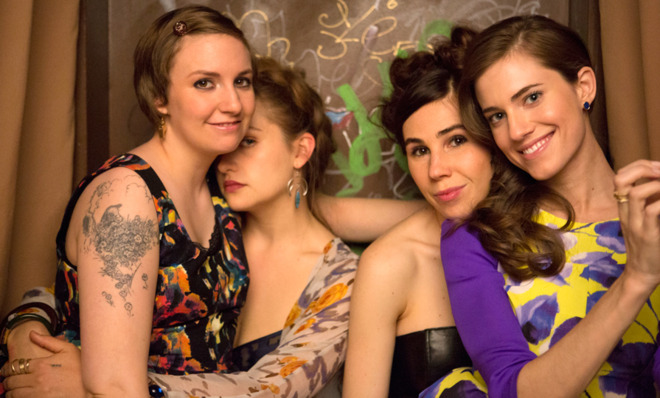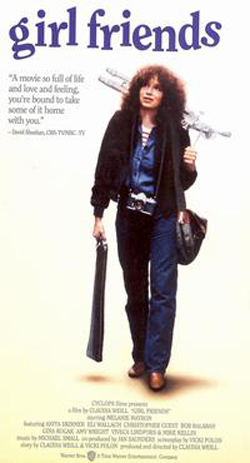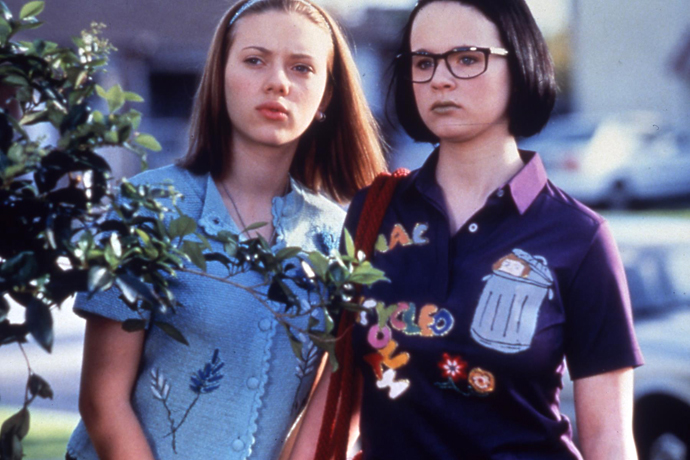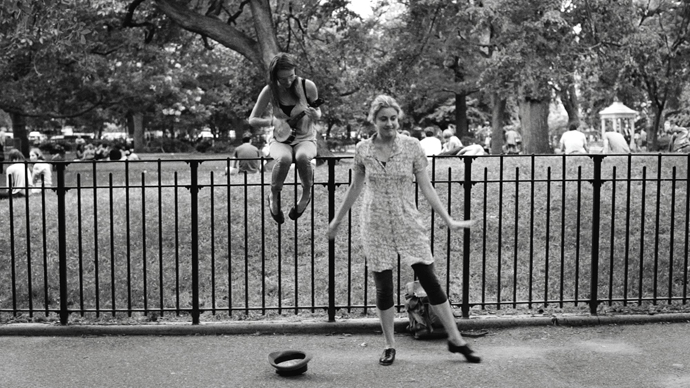Girls on Film: Girlfriends, the most influential film about female friendship you've never heard of
Modern hits like Ghost World, Girls, and Frances Ha can be traced back to Claudia Weill's groundbreaking 1978 film


There's a common narrative about the rise of movies about female friendship. Sex and the City paved the way for Bridesmaids, which led to the rise of Lena Dunham and Girls, the whimsy of Frances Ha, the action of The Heat, the comedy of Broad City, and the one-two punch of Tina Fey and Amy Poehler. But the ongoing trend is less of an evolution than a rebirth, and one that consciously and subconsciously follows the path of a long-overlooked film released 36 years ago: Claudia Weill's 1978 debut Girlfriends.

Girlfriends follows Susan (Melanie Mayron) and Anne (Anita Skinner), inseparable roommates whose friendship knows no bounds. Susan invades Anne's space to take advantage of the great light that falls on her sleeping face; Anne insists on reciting poems while Susan is in the bathroom. Their delightfully symbiotic relationship ends, however, when Anne gets married and moves out. As she deals with pressure of marriage and family, Susan must finally figure out life on her own: how to move up from event photography to artistry, how to make ends meet and pay the bills, and how to choose friends and lovers. (Her suitors: A pre-Spinal Tap Christopher Guest and a post-The Good, the Bad, and the Ugly Eli Wallach.)
Girlfriends was the cinematic embodiment of its inspiration, one line from Eleanor Bergstein's Advancing Paul Newman: "This is a story of two girls, each of whom suspected the other of a more passionate connection with life."
The Week
Escape your echo chamber. Get the facts behind the news, plus analysis from multiple perspectives.

Sign up for The Week's Free Newsletters
From our morning news briefing to a weekly Good News Newsletter, get the best of The Week delivered directly to your inbox.
From our morning news briefing to a weekly Good News Newsletter, get the best of The Week delivered directly to your inbox.
The independent film was a critical success, winning the People's Choice Award at the Toronto International Film Festival, a BAFTA nomination for Mayron, and a Golden Globe nod for Skinner. Warner Brothers picked up Girlfriends for distribution, and Columbia Pictures tapped Weill to helm the 1980 dramedy It's My Turn, which People dubbed an aptly titled project for one of the industry's "promising young comers."
But this was all happening at a time in which women were "unquestionably discriminated against," explained People, which simultaneously contributed to the problem by blaming the imbalance on female-directed box office bombs. It framed Weill as the director "supposedly walked all over" by the film's stars and producer, and a woman who struggled with the intersection of the three F's: feminism, filmmaking, and family. Despite those alleged hurdles, Weill remained upbeat: "I'm accepted as a director now. In 10 years I expect that no one will even think of me as a woman director."
Sadly (and more than a bit ironically), that didn't happen. In 10 years, Weill was mostly forgotten; in 20, completely forgotten. After her second feature, Weill turned to theater work before starting a family and moving to television for the "much shorter commitment" that would allow her to raise her children. Girlfriends briefly lived on in thirtysomething — a popular TV series, sometimes directed by Weill, which allowed Mayron to channel Girlfriends' Susan into her new photographer character Melissa.
But time kept passing — and much like how Alfred Hitchcock's admiration for Alice Guy-Blache failed to keep her in cinema history, not even Stanley Kubrick's effulgent praise could keep Girlfriends' achievements in the cultural conversation. When Vicente Molina Foix interviewed the director in 1980, asking for his thoughts on the filmmaking of men "like Coppola, Schrader, Spielberg, Scorsese, or DePalma," Kubrick ignored the tendency to talk about the usual male talent of that generation. He responded:
A free daily email with the biggest news stories of the day – and the best features from TheWeek.com
I think one of the most interesting Hollywood films, well not Hollywood — American films — that I've seen in a long time is Claudia Weill's Girlfriends. That film, I thought, was one of the very rare American's films that I would compare with the serious, intelligent, sensitive writing and filmmaking that you find in the best directors in Europe. It wasn't a success, I don't know why; it should have been. Certainly I thought it as a wonderful film. It seemed to make no compromise to the inner truth of the story, you know, the theme and everything else. [Taschen]

(Facebook.com/GhostWorldOfficial)
But even if Girlfriends itself disappeared from the cultural conversation, its influence could be felt long after its original release. 2001's Ghost World plays like an idiosyncratic, illegitimate child of Girlfriends. Protagonist Enid Coleslaw (Thora Birch) was the new Susan, immersed in her art and trying to figure out how to live as singular person, and not just half of a duo with her best friend Rebecca (Scarlett Johansson). She flirts with boys her own age and considers the questionable but irresistible allure of strange older men. She is also, essentially, the daughter of one of Girlfriends' characters: Bob Balaban, who played Anne's husband in Weill's film, also played Enid's father.
Girlfriends was also an almost otherworldly inspiration for Lena Dunham. Girlfriends "feels like my oldest influence, yet I saw it for the first time less than a year ago," explained Dunham when she added the film to a Brooklyn movie series she curated. "From the first shot, I was transfixed. By the complex relationships, the subtlety, the odd comedy that was awkward long before awkward was cool." Setting up another screening of the film, Dunham admitted: "I almost thought, 'Have I seen this and been gently ripping it off for the last five years?'"
It's not hard to see where she's coming from. Dunham relishes in explorations of women and imperfection in both in her films and in Girls. But decades before Girls' Hannah struggled with the clash between art and the need to make money, Girlfriends' Susan was giving up her monotonous event gigs the minute she sold a photo. Before Hannah shared a tub with a friend, Anne was invading her closest confidante's private bathroom time. Before the poetry and gallery shows of Tiny Furniture, there was the poetry and gallery shows in Girlfriends.
As Dunham loudly and repeatedly expressed her appreciation for Girlfriends, Greta Gerwig quietly nodded, admitting in 2013 that she was inspired by the film when she explored female friendship in Frances Ha. Indeed, if Dunham's echo of Girlfriends is intriguing, the similarities between Girlfriends and Frances Ha are blatant.

Frances and Sophie in Frances Ha are this generation's Susan and Anne. Their friendship is tight, intrusive, and uncompromising until Sophie finds love. At first, like Anne, she's unsure of her feelings for her straight-laced man, until she decides to take the plunge, move out, and commit herself fully to her new partner. And while Sophie faces the struggles of commitment, Frances figures out how to be on her own.
Like Susan, Frances has a practical but unsatisfying job that gives her some money, but doesn't completely pay the bills or fulfill her artistic urges. Both Sophie and Anne struggle with commitment, pregnancy, and trying to keep their senses of self while dealing with the jealousy of what she perceives as her friend's "more passionate connection with life." Frances and Susan both struggle with the fear of commitment, bills, and adulthood while feeling the same jealousy.
More than 30 years after its release, it's clear that Girlfriends dropped out of sight, but not out of mind — a development that recalls a pivotal scene in the film. Standing alone in her now-empty apartment, Susan records a new answering machine message: "Hello, this is the recorded voice of S. Weinblatt. S stands for Salome, and today's fruit is the plum. Bye!" A moment later, the power shuts off, plunging her into darkness. As she screams in frustration, Anne is with her husband in another part of town, writing a thank-you note. "Dear Aunt Cheryl, Thank you for the hideous Buddha, which we will bury." Her straight-laced beau stops her, and she looks at him defiantly — temporarily alone in her partnership, and missing her female companion in comedy.
Susan and Anne aren't just two women going on separate paths; they're two women who need to reconnect, because their choices changed their futures but not who they are. Today's world is very different from the '70s, but as Ghost World, Girls, Frances Ha, and other stories about powerful female friendships re-emerge, it's time to revisit the long-overlooked classic that relishes in the beautifully dark comedy of female friendship.
Girls on Film is a weekly column focusing on women and cinema. It can be found at TheWeek.com every Friday morning. And be sure to follow the Girls on Film Twitter feed for additional femme-con.
Monika Bartyzel is a freelance writer and creator of Girls on Film, a weekly look at femme-centric film news and concerns, now appearing at TheWeek.com. Her work has been published on sites including The Atlantic, Movies.com, Moviefone, Collider, and the now-defunct Cinematical, where she was a lead writer and assignment editor.
-
 Wilde Cambridge: home-away-from-home in a prime city spot
Wilde Cambridge: home-away-from-home in a prime city spotThe Week Recommends This laid-back aparthotel is the perfect base for a weekend of exploring
-
 The best alcohol-free alternatives for Dry January
The best alcohol-free alternatives for Dry JanuaryThe Week Recommends Whether emerging from a boozy Christmas, or seeking a change in 2026, here are some of the best non-alcoholic beers, wines and spirits to enjoy
-
 A lemon-shaped exoplanet is squeezing what we know about planet formation
A lemon-shaped exoplanet is squeezing what we know about planet formationUnder the radar It may be made from a former star
